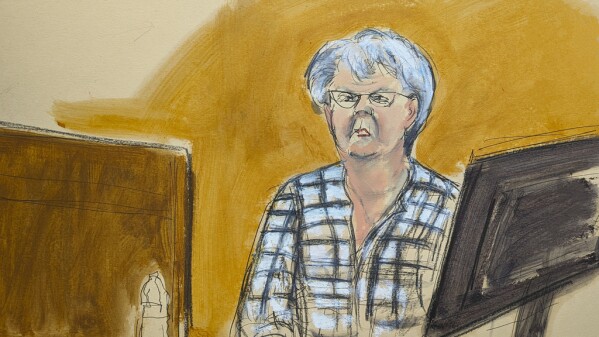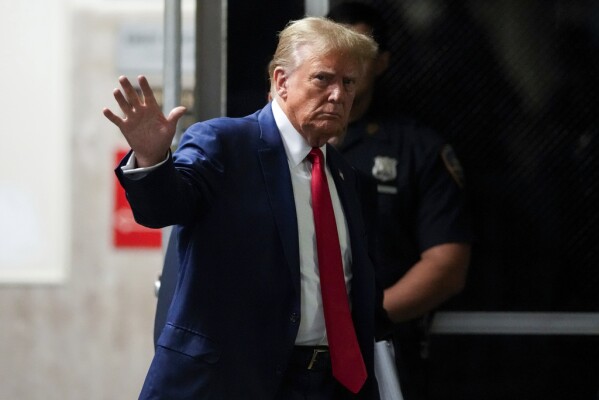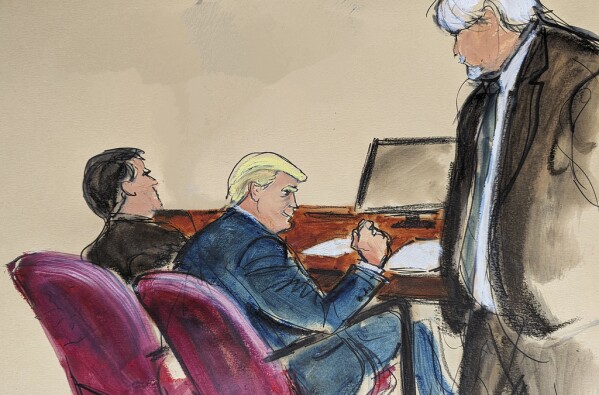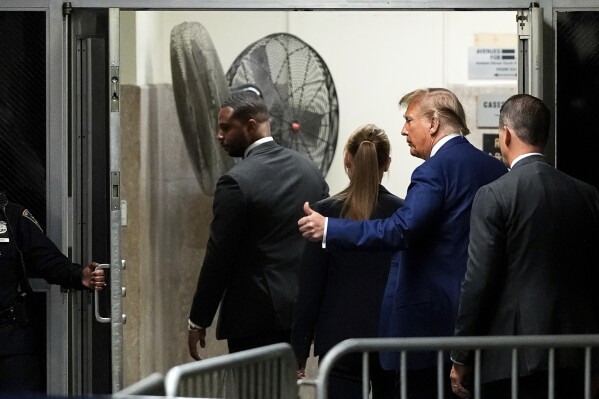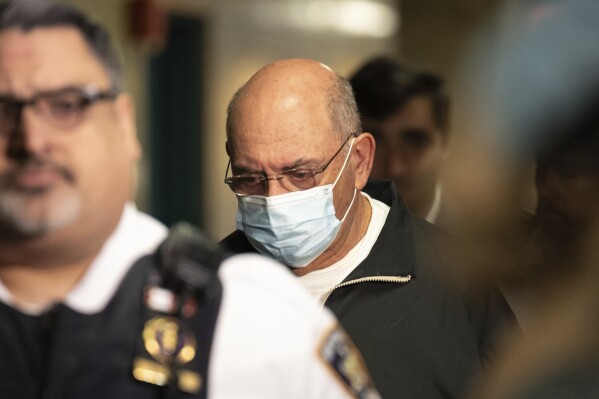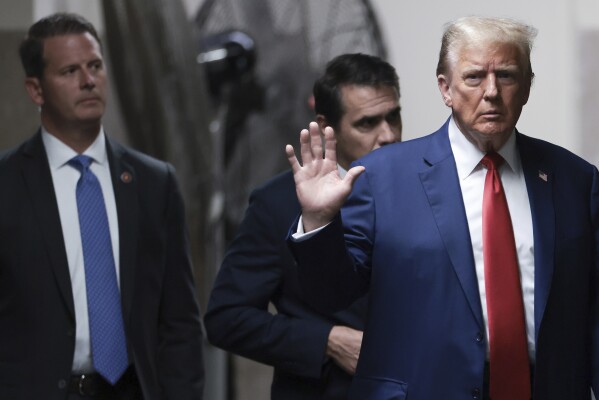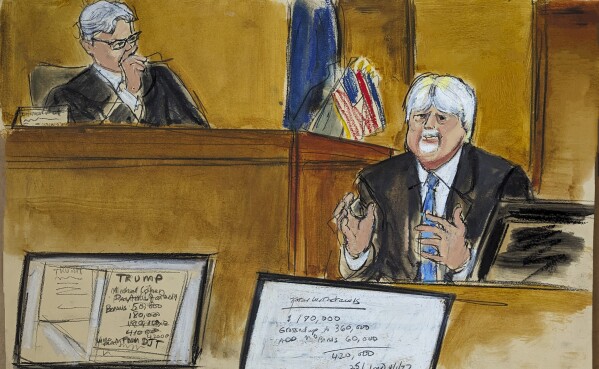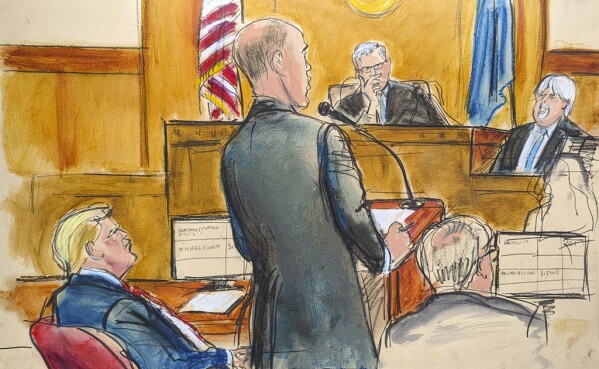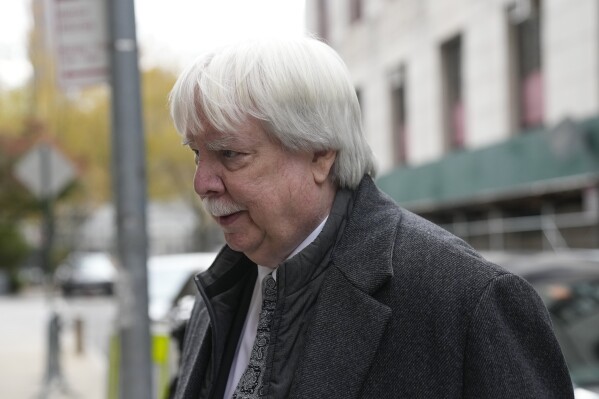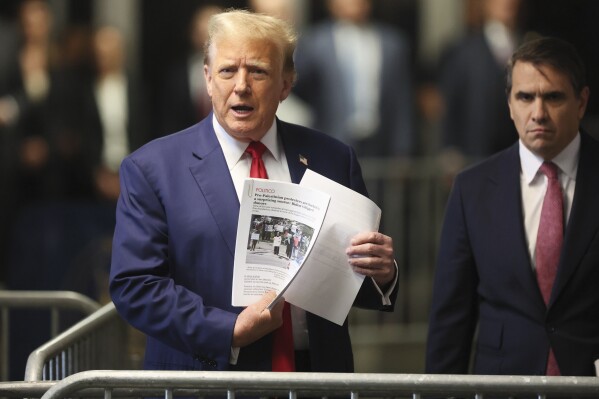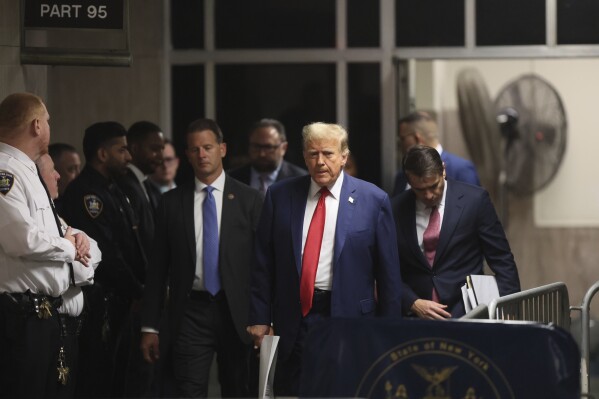Highlights from day 12 of the Trump hush money trial as trial enters third week of testimony
The judge presiding over Donald Trump’s hush money trial fined him $1,000 on Monday and warned of jail time for future gag order violations while jurors heard testimony for the first time about the financial reimbursements at the center of the case.
This live coverage has ended. Follow live updates as Trump’s hush money trial resumes.
Donald Trump’s hush money trial has entered its third week of testimony Monday after crucial witnesses took the stand last week in New York.
The trial has adjourned for the day.
Here’s what to know:
- Who’s testifying? On Tuesday, the jury heard testimony from publishing exec Sally Franklin and porn actor Stormy Daniels, one of the trial’s key witnesses.
- Gag order ruling: The judge has again held Trump in contempt of court and fined him another $1,000 for commenting publicly on the trial, sternly warning the former president of the possibility of jail for future violations.
- What this case is about: Trump is charged with 34 felony counts of falsifying business records as part of a scheme to bury stories that he feared could hurt his 2016 campaign.
- Trump’s investigations: The hush money case is just one of the criminal cases the former president is facing.
Trump ended his day in court by suggesting he’s willing to go to jail to keep railing against his case.
Trump complained about the gag order that bars him from talking about jurors, witnesses and some others connected to the trial, telling reporters: “I have to watch every word I tell you people ... because this judge has given me a gag order and said you’ll go to jail if you violate it.”
“And frankly, you know what? Our Constitution is much more important than jail,” he went on. “It’s not even close. I’ll do that sacrifice any day.”
Trump also complained about the case potentially lasting another two to three weeks, as has been expected, calling it “election interference.”
“This case should be over. This case should have never been brought,” he said. “I thought they were finished today,” he said, charging “they all want to keep me off the campaign trail.”
He also said he thinks his legal team is doing “very well.”
Assistant District Attorney Joshua Steinglass told Judge Juan M. Merchan that the prosecution’s case is proceeding ahead of schedule and he estimates being finished calling witnesses two weeks from Tuesday.
Once the prosecution is done, Trump’s lawyers can then call their own witnesses.
The trial is adjourning for the day, about a half-hour earlier than expected. It appears prosecutors opted not to put on another witness for such a short time at the end of the day.
Tarasoff is done on the witness stand after a brief cross-examination. Trump lawyer Todd Blanche’s questions focused on having the accounts payable supervisor acknowledge that she got permission to cut the checks in question not from Trump himself but from his company’s chief financial officer and controller.
“You never had any reason to believe that President Trump was hiding anything or anything like that?” Blanche asked.
“Correct,” Tarasoff replied.
Trump’s lawyers are getting a chance to question Tarasoff after prosecutor Christopher Conroy took her through a lengthy series of invoices, vouchers, checks and stubs associated with the 2017 payments to Cohen at the heart of the charges.
The trial is resuming after a mid-afternoon break, with Trump Organization accounts payable supervisor Deborah Tarasoff back on the stand.
Trump left the courtroom and waved his fist as he walked through the hallway.
As prosecutor Christopher Conroy and Tarasoff plodded through a series of checks, stubs and vouchers related to the Cohen payments, Trump at one point gestured at the tabletop monitor displaying the documents before him and briefly whispered with one of his lawyers, Emil Bove.
Jurors are getting their first look at the checks used to reimburse Michael Cohen for his $130,000 hush money payment to porn actor Stormy Daniels, including some bearing former President Donald Trump’s trademark signature.
Prosecutors showed the checks as they questioned Deborah Tarasoff, the Trump Organization accounts payable supervisor who processed the payments.
Most of the checks were paid out of Trump’s personal account and were signed by him at the White House, Tarasoff testified.
Two other checks shown was drawn from Trump’s revocable trust, which was used to hold his assets while he was president. It bore the signatures of two trustees, Trump’s son, Donald Trump Jr., and the Trump Organization’s longtime finance chief Allen Weisselberg.
The checks were logged in internal records as legal expenses arising from a retainer agreement. Prosecutors allege the payments were mislabeled to conceal Cohen’s reimbursement and the underlying hush-money payment.
Cohen started getting the checks soon after leaving full-time employment with Trump’s company, the Trump Organization. He started submitting invoices for $35,000 per month for a total of $420,000.
A prior witness said Cohen was paid that amount to cover the cost of the $130,000 reimbursement, another expense he incurred for technology services, plus a bonus and money for him to pay taxes on the money as if he were receiving it as income, rather than a tax-free reimbursement.
Once Donald Trump became president, payments from his personal account had to first be delivered, via FedEX, to his new residence in Washington, Tarasoff testified.
“We would send them to the White House for him to sign,” she said.
The checks would then return with Trump’s sharpie signature. “I’d pull them apart, mail out the check and file the backup,” she said, meaning putting the invoice into the Trump Organization’s filing system.
Jurors are looking on passively as Tarasoff goes through the minutiae of check-cutting procedures at Trump’s company.
Tarasoffs’ testimony began with her describing the nature of her job and familiarity with key figures in the Trump Organization, including Michael Cohen and two of the trial’s previous witnesses, Rhona Graff and Jeffrey McConney.
Asked by prosecutor Christopher Conroy to describe Weisselberg’s management style, she replied, “He had his hands in everything.” By contrast, Tarasoff said her job was to pretty much follow instructions passed down from on high.
“I get approved bills, I enter them in the system, and I cut the checks,” she said matter-of-factly.
Tarasoff was the recipient of a 2017 email in which then-controller Jeffrey McConney told her “post to legal expenses” with regard to the handling of reimbursement payments to Michael Cohen. She prepared the checks used to pay Cohen.
Tarasoff and McConney both worked under longtime company chief financial officer Allen Weisselberg. Tarasoff previously testified at the Trump Organization’s 2022 trial on unrelated tax fraud charges.
In that case, she testified that she knew nothing about Weisselberg’s scheme to evade taxes on $1.7 million in company-paid perks and was just following orders when she processed payments from Trump Organization accounts for his personal expenses.
Also in that testimony, Tarasoff said she agreed with a defense lawyer’s description of Weisselberg as an exacting, authoritarian micromanager who enjoyed immense trust within the company.
Tarasoff said that in September 2016, as the presidential vote that catapulted Trump to the presidency neared, Weisselberg ordered her to start deleting notations about some of the transactions in the company’s bookkeeping system. Tarasoff said she didn’t think Weisselberg was asking her to do anything illegal.
But even if he had, she said: “I guess I would because he’s the boss and he told me to do it.”
He walked in a few minutes before the scheduled 2:15 p.m. ET restart. He looked at reporters in the gallery as he passed, then stood for a moment at the defense table, looking back and grinning.
Before the lunch break, McConney testified that Cohen’s first few payments were drawn out of Trump’s revocable trust by mistake because the Trump Organization was still sorting out how to pay Trump’s personal bills after he went to the White House.
McConney testified that they switched to making Cohen’s payments from Trump’s personal account once they figured out a method of getting checks to the White House, having them signed by Trump, returned to the organization and sent out.
Bove, echoing McConney’s earlier descriptions, at one point referred to the time after Trump’s election as a “period of flux and chaos at the Trump Organization.”
“That’s putting it mildly,” McConney said.
McConney also testified that while he hadn’t spoken to either Trump or Weisselberg about the reimbursement payments, he’d come to feel that he was kept in the dark about certain matters.
“This was all happening above your head?” asked Colangelo, the prosecutor, to which he replied: “Yes.”
“You were told to do something and you did it?” the prosecutor continued. “Yes,“ McConney repeated.
In a riposte to prosecutors’ questions that elicited that McConney never saw a legal retainer agreement for Cohen, Bove asked whether retainers can be verbal. “To my knowledge, yes,” McConney said.
Bove then wrapped up his cross-examination of McConney. After a quick second round of questions from prosecutor Matthew Colangelo and Bove apiece, his time on the stand is over.
The court is now breaking for lunch.
Prosecutors have argued that the 2017 payments to Cohen – including his reimbursement for shelling out $130,000 to Stormy Daniels -- weren’t legitimate legal expenses. The defense argues otherwise, and Bove got McConney to acknowledge that he didn’t know whether or not Cohen did indeed do legal work for Trump in 2017.
For example, Bove brought up a defamation lawsuit that Trump was facing from then-"Apprentice” contestant Summer Zervos. She accused Trump of subjecting her to unwanted kissing and groping in 2007 and then slurring her when she went public during his 2016 campaign.
He denied all her claims. She dropped the suit in 2021.
McConney testified that he had “no idea” whether Cohen worked on the Zervos matter.
Other attorneys represented Trump in court appearances and filings during at least many of the years of the case.
The former Trump Organization controller testified that Trump never directed him to log Cohen’s payments as legal expenses, nor did Weisselberg relay to him that Trump wanted them logged that way.
“Allen never told me that,” McConney testified.
In fact, McConney said he never spoke to Trump about the reimbursement issue at all.
As for Cohen, McConney said his interactions with Trump’s then-lawyer were “minimal.” He said that other than emails about invoices, he never spoke to Cohen about the reimbursement arrangement.
Though he testified that he logged Cohen’s payments as “legal expenses” because Cohen was a lawyer, McConney again appeared somewhat skeptical of his work.
At the time of the payments, “Mr. Cohen was a lawyer,” Bove said, seeking to underscore that the payments were legitimate legal expenses.
“OK,” McConney testified, spurring laughter throughout the courtroom. “Sure. Yes.”
Underscoring his point that Cohen was acting as a lawyer to Trump, Bove directed McConney to the signature in a February 2017 email, which reads: “Personal attorney to President Donald J. Trump” and shows a Gmail address, rather than a Trump Organization email.
“It doesn’t say ‘fixer’ does it?” Bove asked, referencing a title commonly applied to Cohen.
“No,” McConney responded.
Bove posited that by that point, after leaving his full-time position at the Trump Organization, Cohen was “akin to a vendor to President Trump” and was paid accordingly.
Prosecutors have finished at least their first round of questions for McConney. Trump lawyer Emil Bove is beginning his cross-examination.
Bove began his cross-examination of McConney with questions that hit on a key defense theme: that Cohen was a lawyer, and “payments to lawyers are legal expenses,” are they not? McConney agreed they were. It’s a point the defense wants to make because part of its argument is that there was nothing illegal about the way Cohen was paid.
While noontime testimony took a dry turn — McConney was authenticating and describing various ledger printouts and tax documents — jurors were nevertheless largely watching the former Trump Organization controller, with some appearing to take notes. One juror cradled his chin in his hand.
If not the juiciest testimony heard so far, it’s legally important, allowing the documents to be entered into evidence. They show the source and scope of payments, including that Cohen was paid $315,000 out of Trump’s personal account and $105,000 out of the trust that handled his assets while he was in the White House.
The former Trump Organization executive, described by a witness Monday as the architect of an arrangement to reimburse Michael Cohen for a hush-money payment, is currently in jail for lying under oath in another Trump-related case.
Weisselberg, 76, was sentenced last month to five months in jail for lying under oath while testifying in New York Attorney General Letitia James’ civil fraud lawsuit against Trump. He’s currently serving the sentence at New York City’s notorious Rikers Island jail complex.
It’s his second time behind bars. The ex-chief financial officer served 100 days last year for dodging taxes on $1.7 million in company perks, including a rent-free Manhattan apartment and luxury cars. He was also ordered to pay $1 million as part of Trump’s civil fraud judgment.
Weisselberg’s plea agreement doesn’t require him to testify at the hush money trial, and neither side has indicated it plans to call him as a witness.
Cohen told Congress in 2019 that it was Weisselberg who decided how to structure his reimbursement for the payment to Stormy Daniels. Cohen said Weisselberg paid the money out over 12 months “so that it would look like a retainer.”
Trump flashed a smile at someone in the gallery as he exited the courtroom. Alina Habba, a lawyer who serves as a Trump spokesperson and has represented him in other matters, was among the entourage following him out of the courtroom.
The former president gave a thumbs up as he went through the hallway.
After paying the first two checks to Cohen through a trust, the remainder of the checks — covering payments for April to December 2017 — were paid from Trump’s personal account, McConney testified.
With Trump, the only signatory to that account, now in the White House, the change in funding source necessitated “a whole new process for us,” McConney added.
“Somehow we’d have to get a package down to the White House, get the president to sign the checks, get the checks returned to us and then get the checks mailed out,” he testified.
Getting to a key part of the case — how and why Cohen’s reimbursement for the Daniels payment was entered as a legal expense — McConney testified that he instructed an accounting department employee to do so.
All expenses had to be entered in the general ledger with a category code, and “we were paying a lawyer,” McConney explained. So in went the code: 51505.
He also instructed the employee to record that the first two payments were for a “retainer” for the months of January and February 2017.
“I was just taking information from the invoice” Cohen had typed into an email, McConney said, though he acknowledged he’d never seen a retainer agreement between Cohen and the company.
A bank statement displayed in court showed Cohen paying $130,000 to Davidson, Daniels’ lawyer, on Oct. 27, 2016, out of an account for an entity Cohen created for the purpose.
Weisselberg’s handwritten notes about reimbursing Cohen were stapled to the bank statement in the company’s files, McConney said.
Those notes spell out a plan to pay Cohen a base reimbursement of $180,000 — covering the payment to Davidson and an unrelated technology bill. That total was then doubled or “grossed up” to cover the state, city and federal taxes Weisselberg estimated Cohen would incur on the payments.
Weisselberg then added a $60,000 bonus, for a total of $420,000, according to the notes. That money was to be paid out in 12 monthly installments of $35,000 each.
McConney’s own notes were also shown in court. After calculations that laid out that Cohen would get $35,000 a month for 12 months, McConney wrote: “wire monthly from DJT.”
Asked what that meant, McConney said: “that was out of the president’s personal bank account.”
McConney said he didn’t know of any other time when the company added onto an employee reimbursement to cover the cost of taxes. Employee reimbursements, if characterized as such, are not subject to taxation.
Trump is accused of falsifying business records by labeling the money paid to Cohen in his company’s records as legal fees. Prosecutors contend that by paying him income and giving him extra to account for taxes, the Trump executives were able conceal the reimbursement.
For the first time, jurors are hearing about the reimbursements at the root of the falsifying business records charges against Trump.
McConney testified about conversations he had with the company’s longtime finance chief Allen Weisselberg in January 2017 about reimbursing Cohen for $130,000 he’d paid to lawyer Keith Davidson. Davidson was the lawyer for porn actor Stormy Daniels.
“Allen Weisselberg said we had to get some money to Michael, we had to reimburse Michael. He tossed a pad toward me and I started taking notes on what he said,” McConney testified, recalling a Jan. 27, 2017, meeting with Weisselberg. “That’s how I found out about it.”
“He kind of threw the pad at me and said, ‘take this down,’” McConney testified.
Cohen, who’d worked for the Trump Organization for about a decade, had just been taken off the payroll as a salaried employee.
As prosecutors shift their questions to the subject of Cohen, McConney — like multiple witnesses before him — doesn’t seem to be a fan.
Asked if he was familiar with the former Trump attorney and fixer, McConney paused briefly, before adding: “I’ve had conversations with him by the coffee machine.” In response to a question about Cohen’s position within the Trump Organization, McConney responded dryly: “He said he was a lawyer.”
In an anecdote from early in his career, McConney described Trump’s close attention to his cash and hardball approach to bills.
When he went to drop off a report on Trump’s desk one day in the late 1980s, the then-real estate mogul looked up while on the phone and said, “Jeff, you’re fired.”
McConney was taken aback. Then Trump added, according to the ex-controller: “You’re not fired, but my cash balances went down from last week.”
McConney explained that various expenses had come up. Trump responded that he should “focus on my bills, negotiate my bills.”
“It was a teaching moment,” McConney recalled. The lesson? “If someone’s asking for money, negotiate with them,” rather than just paying.
From the defense table, Trump appeared to enjoy hearing the story, lifting his chin and smiling broadly in McConney’s direction.
Former Trump Organization controller Jeffrey McConney has taken the stand.
He worked for Trump’s company for about 36 years, retiring last year after he was granted immunity to testify for the prosecution at the Trump Organization’s New York criminal tax fraud trial, where he admitted breaking the law to help fellow executives avoid taxes on company-paid perks. The company was convicted and is appealing.
He left the company last year with $500,000 in severance, and went on to testify tearfully last fall at the civil fraud trial of Trump, the company and key executives — including McConney. The ex-controller said he’d been worn out by his entanglement in a litany of Trump-related investigations and legal proceedings. “I just wanted to relax and stop being accused of misrepresenting assets for the company that I loved working for,” he said at the time.
Trial watchers were joined in the overflow room Monday morning by a group of students from a Manhattan private school, who said they were given the morning off school to attend.
“That’s him!” one of the high schoolers yelped earlier in the morning as Trump appeared on the video monitor. She was promptly shushed by one of her classmates.
The judge found Trump had violated the gag order for comments he gave to a program called “Just the News No Noise” on April 22, which is broadcast on Real America’s Voice.
On the program, Trump criticized the speed at which the jury was picked and claimed it was stacked with Democrats. “The jury was picked so fast. 95 percent Democrats. The area’s mostly all Democrat,” he is quoted as saying.
In his ruling, Judge Merchan said the comments “not only called into question the integrity, and therefore the legitimacy of these proceedings, but again raised the specter of fear for the safety of the jurors and of their loved ones.”
“Defendant is hereby put on notice that if appropriate and warranted, future violations of its lawful orders will be punishable by incarceration,” the judge wrote in the order.
▶ Read the full gag order ruling.
Judge Juan M. Merchan has again held Trump in contempt of court and fined him another $1,000 for violating the gag order, sternly warning the former president of the possibility of jail for future violations.
He said Trump’s statement “threaten to interfere with the fair administration of justice and constitute a direct attack on the rule of law. I cannot allow that to continue.”
“As much as I don’t want to impose a jail sanction,” the judge added, “I want you to understand that I will have to if necessary and appropriate.”
Prosecutors had accused Trump of four violations, but the judge only concurred with one.
The judge had previously fined Trump $9,000 for nine earlier violations in posts on Truth Social and his website.
Before heading into the courtroom, the former president spoke to reporters, relaying familiar complaints about the fairness of the trial, the judge and the gag order that stops him commenting on witnesses and jurors.
He also noted the breaking news that Columbia University has canceled its main commencement following weeks of pro-Palestinian protests.
“That shouldn’t happen,” he said.
Donald Trump’s motorcade has arrived at the criminal courthouse in lower Manhattan as the third week of testimony is set to begin in his hush-money trial.
He’ll be in court for the third week of witness testimony.
In the first criminal trial of a former U.S. president, Donald Trump, terms like “hush money” and “catch-and-kill” are central. The Associated Press defines these terms.
Hush money, catch and kill and more: Donald Trump’s New York criminal trial is full of terms you don’t typically hear in a courtroom.
Centering on allegations Trump falsified his company’s records to conceal the nature of hush money reimbursements, it’s the first ever criminal trial of a former U.S. president and the first of Trump’s four indictments to go to trial. It also has some unique terminology.
Virtually every day of his hush money criminal trial, former President Donald Trump talks about how he can’t talk about the case.
A gag order bars Trump from commenting publicly on witnesses, jurors and some others connected to the matter. The New York judge already has found that Trump, the presumptive Republican nominee for president, repeatedly violated the order, fined him $9,000 and warning that jail could follow if he doesn’t comply.
But the order doesn’t stop Trump from talking about the allegations against him or commenting on the judge or the elected top prosecutor. And despite a recent Trump remark, it doesn’t stop him from testifying in court if he chooses.
As he fights the felony charges against him while running for president, Trump has at times stirred confusion about what he can and can’t do in the case.
▶ Read more on what the order does, what it doesn’t and where it comes from.
Crucial witnesses took the stand in the second week of testimony in Donald Trump’s hush money trial, including a California lawyer who negotiated deals at the center of the case and a longtime adviser to the former president.
Jurors heard a potentially pivotal piece of evidence — a 2016 recording of Trump discussing a plan to buy a Playboy model’s silence — as well as testimony about the wrestler Hulk Hogan and hurricanes, literal and figurative.
Outside the jury’s presence, Trump was fined for running afoul of a judge’s gag order. Additional sanctions could await the presumptive Republican nominee for president.
Hope Hicks testified Friday in Donald Trump’s hush money case, recounting how she followed Trump from the real estate world to politics and how his 2016 presidential campaign was turned upside down following a leak of the infamous “Access Hollywood” tape. Testimony resumes on Monday.
Donald Trump’s 2016 campaign was seized with worry about the potential political damage from a tape that showed Trump bragging about grabbing women sexually without their permission, longtime Trump adviser Hope Hicks testified last week at his hush money trial.
Hicks, a former White House official, was compelled to testify by Manhattan prosecutors, who are hoping her remarks bolster their argument that the uproar over the infamous “Access Hollywood” tape hastened Trump’s then-lawyer to pay off porn actor Stormy Daniels to bury a negative story that could imperil his 2016 presidential bid.
Once one of Trump’s closest confidants, Hicks provided a window into the chaotic fallout over the tape’s release just days before a crucial debate with Democrat Hillary Clinton. It was recorded in 2005 but was not seen by the public until Oct. 7, 2016, about a month before Election Day. Hicks described being stunned and huddling with other Trump advisers after learning about the tape’s existence from the Washington Post reporter who broke the story. Hicks forwarded the reporter’s request to campaign leadership with the recommendation to “deny, deny, deny,” she said.
Hope Hicks, a former longtime adviser to Donald Trump, took the witness stand Friday in his criminal trial, where prosecutors are expected to question her about her knowledge of hush money payments made during the 2016 presidential campaign.
Prosecutors in Donald Trump’s hush money trial are moving closer into his orbit following an inside-the-room account about the former president’s reaction to a politically damaging recording that surfaced in the final weeks of the 2016 campaign.
Hope Hicks, a former White House official and for years a top aide, is by far the closest Trump associate to have taken the witness stand in the Manhattan trial.
The trial enters its third week of testimony Monday with prosecutors building toward their star witness, Michael Cohen, Trump’s former lawyer and personal fixer who pleaded guilty to federal charges related to the hush money payments. Cohen is expected to face a bruising cross-examination from defense attorneys seeking to undermine his credibility with jurors.

